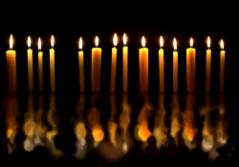Epiphany
Magi were wise men who came from the East, following a star until it led them to the Christ child: they brought their gifts of gold, frankincense and myrrh, symbols of who Jesus is (see below). The Bible does not call them Kings, nor does St Matthew give them names, but in tradition they are called Caspar, Melchior and Belthazar.
The purposes of the gifts was as follows::
Gold: means power and riches and symbolised that Jesus was going to be King.
Frankincense (or incense): incense is used in the worship of many religions then and now. It was offered in the Temple at Jerusalem, and is still in many churches today. It is a sign of the presence of God, and that something is holy. So in the Epiphany story it shows us that Jesus is the Son of God.
Myrrh: was used to prepare bodies for burial. This sweet smelling gum comes from the myrrh plant and was used as a perfume. Its gift to Jesus at Epiphany is a sign that Jesus is human too, and that he will share our death. It points to the importance of Jesus' death for Christians, as he offered himself in love to the Father.
Epiphany means Revelation: the gifts show us who Jesus is and what he will do, and the visit of the Wise Men from the East (who were not Jews) tells us that Jesus comes not just for God's ancient people, the Jews, but for all peoples (in bible language, the Gentiles).
This theme of Revelation, showing who Jesus is, continues in two other events in the life of Jesus which Christians remember at this season: The Baptism of Jesus, and his first miracle, Changing Water into Wine.
BAPTISM

JESUS FIRST MIRACLE

Continuing the theme of Revelation, at Epiphany Christians remember Jesus' first miracle, which was the turning of water into wine at a wedding feast in Cana in Galilee. Jesus was there with some friends. His mother was also there and persuaded him to turn jars of water into fine wine, when the wine had run out. This miracle shows us two things: first again, who Jesus is, the Lord of creation, changing water into wine; second, the overwhelming generosity of God's love, care and provision in the abundance of wine, some twenty or thirty gallons, according to the Gospel!
CANDLEMAS

The Feast of Candlemas (February 2nd) celebrates the purification of Virgin Mary and the presentation of Jesus in the Temple.
According to St Luke, Jesus was brought to the Temple by his parents, as part of a Jewish tradition that the firstborn son should be presented there. He was met by an old and faithful servant of the Lord, Simeon, who uttered the words:
"Lord, now let your servant depart in peace; according to Your word: for my eyes have seen Your salvation, which You have prepared before the face of all people: to be a light to lighten the gentiles and to be the glory of Your people Israel".
Thus we remember Jesus as 'the light of the world coming into the world'.
The date of February 2nd is traditionally kept as the day when, in times gone by, all candles which were to be used in the church in the coming year, were brought into the church to be blessed. Most Churches still celebrate Candlemas with a procession and blessing of lighted candles.
Candlemas Day Weather-lore
In times gone by, people believed that Candlemas Day
predicted the weather for the rest of the winter. The following weather proverb is an example:
If Candlemas Day be fair and bright
Winter will have another fight.
If Candlemas Day brings cloud and rain,
Winter won't come again.If Candlemas Day be dry and fair,
The half o' the winter's to come and mair;
If Candlemas Day be wet and foul,
The half o' the winter's gane at Yule.
